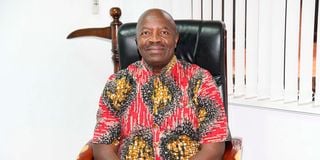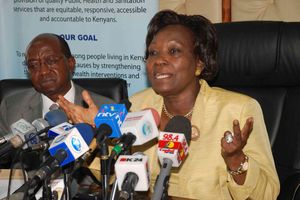
Prof Ronald Wasike is a breast surgical oncology and general surgeon.
There is so much you learn working 28 years in one career. Prof Ronald Wasike has been in one career- breast, general surgery and breast oncology, for all those years.
BDLife met him at the Doctor’s Plaza at Aga Khan University Hospital. He says he has retired, but do doctors really retire?
His reputation has preceded him in matters breasts. I ask whether, up to now, he knows breasts like the palm of his hand. He tells me, that is what they call expert knowledge.
“But, when you love your profession, you should play all the time in ignorance. More so, you read more. I read and write… Currently, I’m looking at how AI [artificial intelligence] would be utilised in breast cancer and surgery. I also like reading non-fiction books every week, and I’m in a book club with my firstborn son. We meet every two weeks to discuss books we have read,” he says.
On his table, there is a silicone breast. I look at it inquisitively.
“That’s an implant,” he says, “after cancer surgery, we remove the breast. You can leave the chest flat but some patients look at the mirror and feel a little disturbed. So we reconstruct the breast and put in an implant. This is silicone but what we use is mainly saline implants (meaning they contain sodium chloride),” he says.
Does the implant after mastectomy, affect one’s day-to-day activities?
“No,” he says, “we put it behind the muscle. It looks very nice… you know 12 o’clock, very attractive.”
Did you always want to be a breast surgeon?
No, I always wanted to be a doctor, but not a breast surgeon. I took my mother to Kakamega Provincial Hospital when I was young. There were no doctors. Some clinical officers were drunk, there was no medicine. I saw a gap, we needed more doctors and clinical officers.
I did a Bachelor of Medicine and Bachelor of Surgery degree, then did my Master’s in Medicine in General Surgery at the University of Nairobi.
I worked in the army. People thought I was supposed to be an orthopaedic person. Because in the army there were many young men with fractures from injuries and accidents. I did a lot of orthopedics care before I went to study for my Master’s degree.
Then I realised there were more orthopaedic surgeons than breast surgeons. I became the first breast surgeon in East and Central Africa.
I did my training in breast surgery at the University of Alberta in Canada and at Emory University in Atlanta, Georgia, to pursue oncoplastic surgery (removing cancer with a good outlook).
I’m the grandfather of breast surgery. Now, I have trained more of the latter, we are like 10.
How did you land in the military?
It was a tribute to my late grandfather who fought in World War II. I did not see him, only saw him in uniform in a picture on the wall in our house, but you know how children see someone and say they want to be like him…. I wanted to be a soldier because of my late grandfather.
I joined as a medical intern to serve in the military. I even went to the Yugoslavia war for two years in 1993.
What was your aha moment in your military career?
The ability to know how to kill enemies of the country but also how to treat them. That mixture was the aha moment. I’m the only person who had both powers. (Laughter)
But I left the military because I’m an academician. I wanted to become a professor, so after my Master’s degree, I realised it was very hard to move up in terms of academics in the military.
I wanted to push my medical career to include the ability to teach, supervise others, and train them. If I had continued to be in the army, I would be an orthopaedic surgeon, but once I moved, I realised there were many opportunities.
How long have you been a breast specialist?
From 1996 up to now. I specialised in breast oncology later on. I developed an interest when I was doing my Master’s degree at the University of Nairobi. At Kenyatta National Hospital (KNH), we realised that patients who had breast issues came when it was too late.
But it was not their wish. It’s because KNH at that time, was focusing on emergencies. Abdomen issues, intestinal obstruction, appendicitis…those that are threatening to kill patients. So elective things, like a painless lump in the breast of a woman, did not bother them. These patients had to wait.
As I continued studying general surgery, and traveling, I realised that could change if we had a specialised clinic. I thought I would make a difference; that’s why, and I have made it.
After 28 years in this career, what would you say is the key to success?
Passion is what differentiates people. It is not talent. Three components make you either fail or succeed and it is not your IQ [intelligent quotient]. Resilience, perseverance, and passion.
What is the biggest misconception in your profession?
Some patients think that herbs work to heal cancer. They don’t work but prayers work. I know prayers work but do not tempt God. Only pray when you are doing something about your problem.
So what are the common breast problems you have seen in women?
Breast lumps—90 percent of them are not cancerous. So, 10 percent would be cancerous, and the bad thing about them is that they are painless, which is why patients pray until it is too late.
Where does breast pain emanate from?
A lot of breast pain, especially for an African girl who has big breasts, has to do with the size, architecture, and texture of the breast and the length of time the brassiere is worn.
Some wear bras even at night, which is crazy. Those who wear tight bras reinforced with metal and plastic, apparently provide relief for breast pain.
Is breast size genetic?
Yes, it is. Also racial. The biggest breasts are of the black race, followed by Caucasians and the ones with the smallest are Asians. And that has a pairing with breast cancer. The bigger the size, the more likely it is to develop cancer.
The test of ‘self-examining’ of raising your left hand and touching with your right hand the left breast, which holds water.
That is not sufficient. Because clients are not educated enough and now depending on the size of your breasts, texture and the time of your period… because towards your period your breasts become tender and lumpy, and you do not know which lump is which.
This thing of self-examination was hyped for a long time but countries that have noticed how much anxiety and what they miss, like Canada and the US, have abandoned it.
The advice we give is that when you are 20 and older, go every year to see a breast doctor for a check-up. After 40, you should start a mammogram every year until you hit 55, then you should do it every two years until you hit 75.
Which new careers have you seen come up in this field?
You can be a breast radiologist. The breast surgeon sends you the patient to take them through x-rays, mammograms, and ultrasounds and give them a report. You can also be a breast pathologist, which entails looking at the tissues the surgeons have given you in the microscope.
For all these years, what do you struggle with the most?
Telling a patient that ‘you have breast cancer.’ That is the toughest because when they come with the report and then ask me, ‘Wasike what does the report say?’
What was your first cancer case? Were you scared?
No. I have never been. When we were in medical school, we were given dead bodies (cadavers). Some people used to dream about it… I have never. I think I went there having asked God, ‘This is now my business. Do not give me dreams. Do not scare me.’ (Laughs) And it worked.
Like last week, I was operating on a breast where everybody had said, ‘No… we can’t.’ She had been given chemotherapy but the breast burst and the wound was bleeding. In the theatre, the nurses were shocked, and two fled. But now I have discharged her.
You know what she told me on Monday? “I feel like I have delivered a child because this thing [diseased breast], made me not sleep.” You need to be courageous to help your patients but also pray about it…It is the work of God.
Who is the youngest patient you have ever dealt with?
She was a 19-year-old girl with breast cancer. But she was a nursing student. She is alive and kicking and now she is a mother of three and calls me ‘papa.’
Work-life balance seems hard for a doctor to attain. Did you ever learn to juggle work and life balls and let none fall?
You need to change your scenario in life every week. Go out and enjoy nature. Get fresh air. Have your ‘me-moments’. If you are putting in work all the time, you get stressed out, and you won’t have passion for it but burnout.
Do doctors really retire?
They do. Yes, I have retired. I have. I’m not employed but my patients keep calling me back. I retired officially from employment in 2022 at the age of 60 but because my patients told me I couldn’t go, I decided to work on Mondays and Wednesdays.
I used to work Mondays through Saturdays. You can retire fully or semi-retire but do not do anything. But some doctors think they should work until they die on the job which is not right because you don’t have time to balance your life, relax, travel or stay with your grandchildren and run around with them.
Have you passed on the baton?
Yes! I have trained. I’m very lucky, my speciality has attracted a lot of interest from younger doctors. I have done my bit. Many women have since taken over the profession in comparison to men.
But some patients still prefer older doctors to younger ones…
Yeah, it does happen, that is why I’m here. Even the younger doctors refer patients to me. Because medicine, unlike other professions, the relationship between a doctor and a patient can become personal. But you try to encourage them (clients), and the more you work with your team, the easier it is for you and the patients to understand that this is just but a skill and it is transferable.
Did any of your children lean towards medicine?
No! I have four brothers who are doctors but my children are not. I used to work Mondays to Saturdays and my children felt this was too demanding so I gave them the choice to choose what they wanted.
What would you say is your fulfillment in your career?
Now we are seeing patients coming with early disease and therefore the outcomes are better. Some have lived for 15 to 20 years. Some patients have forgotten about the disease and have since given birth but before they used to come when they are about to die, with stage four cancer.








